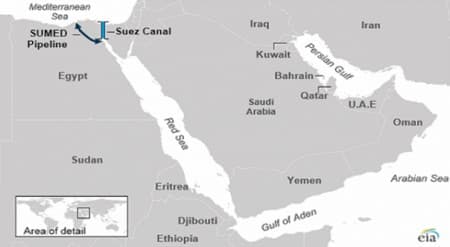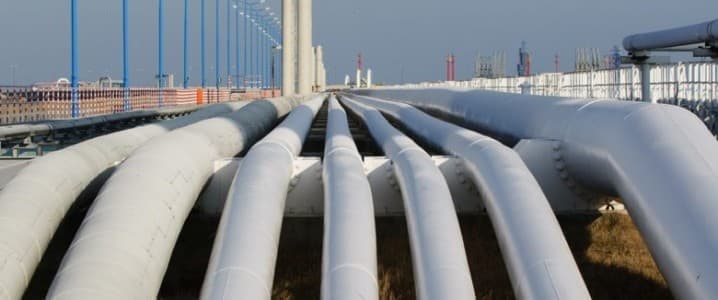President Trump’s Middle East policy was highly incoherent and transformative as it didn't continue the long-term strategies set by previous presidents. However, it did achieve the unprecedented rapprochement between several Arab countries and Israel in the form of the Abraham Accords. Especially the normalization of ties between the UAE and Israel are quickly transforming the balance of power in the region. Already the two countries are discussing cooperation in science and innovation. Furthermore, energy ties are a promising area due to the complementarity of economies and strategic geolocation of Israel.
Last year on October 20th, the Israeli state-owned Europe Asia Pipeline Company (EAPC) and the UAE-based MED-RED Land Bridge signed a historic agreement. The companies intend to use the Eilat-Ashkelon pipeline to move oil from the Red Sea to the Mediterranean. While it serves the interests of both countries, Egypt stands to lose. Although Cairo enjoys good relations with Israel and the UAE, the agreement could deprive it of transit fees for the use of the Suez Canal.
The pipelines can move 400,000 barrels per day to Eilat, and 1.2 million barrels the other way to Ashkelon. Also, oil terminals on both sides have a storage capacity of 3.7 million cubic meters. Furthermore, smaller pipes can transport the oil towards the country’s two major refineries in Ashdod and Haifa.
Related Video: Can Saudis Defend Aramco from Houthis?

The 254-kilometer (158 miles) pipeline is intended to handle the largest ships currently in use that aren’t able to move through the Suez Canal because of their draft. EAPC claims the pipeline saves time, fuel, and costs that would otherwise be wasted. Despite the economic interests, opposition against the pipeline is fierce due to environmental concerns. Eilat is surrounded by coral reefs which could be devasted. Last month’s oil spill on Israel’s Mediterranean coast is an ill harbinger. Related: $70 Oil May Cause Slowdown In Demand Recovery
The agreement has alarmed Egypt. In 2019 the Suez Canal generated $5.8 billion for the Arab country. Together with tourism and remittance, the government is heavily reliant on the waterway to secure hard currency for its modernization plans. Therefore, competition by the Eilat-Ashkelon pipeline will undoubtedly deprive it of certain shipping activities and flow of revenue.
The Suez Canal is one of the most important chokepoints of the global shipping industry. A staggering 24 percent of all international container transport and 100 percent of Asian-European container trade moves through the Canal. Despite Egypt’s domination of international trade, Cairo is already feeling the heat of the Eilat-Ashkelon pipeline. On December 21, 2020, the Suez Canal Authority (SCA) announced that supertankers with tonnage above 250,000 will receive a 48 percent discount.
Egypt is heavily invested in the Canal. The country has spent billions in the expansion of the Suez Canal Economic Zone which extends over 460 square kilometers (178 square miles). The area is being turned into a global industrial and logistical hub.
According to Basant Fahmy, an economic expert, and former member of the parliamentary Economic Affairs Committee, "we have ports and industrial zones in the Suez Canal area and the president is seeking to exploit them. If the government succeeds in exploiting these capabilities, the Suez Canal will have no competitor."
The UAE-Israeli agreement is striking because Egypt already provides services for those supertankers that aren't able to cross the Canal due to their draft. The Sumed pipeline has a capacity of 2.5 million barrels per day and moves oil from the Red Sea to the Mediterranean near Alexandria. The agreement on the Eilat-Ashkelon pipeline shows the extent of the relations between Israel and the UAE.

Although Egypt's economic interests are somewhat threatened by the pipeline deal, Cairo enjoys good relations with both Israel and the UAE. It is unlikely that, besides economic consequences, politics will also be affected. Furthermore, Egypt has quickly become an energy hub for the region due to several large discoveries and two liquefaction plants for LNG. Therefore, the Eilat-Ashkelon pipeline agreement is merely a nuisance and not an existential threat for Egypt’s global transit position.
By Vanand Meliksetian for Oilprice.com
More Top Reads From Oilprice.com:
- Oil Falls After Spiking Due To Missile Attack On Saudi Tank Farm
- Oil Soars As OPEC+ Sources Suggest No Production Increase
- Saudi Surprise Cut May Have Lasting Effect On Oil Prices



















It will compete with the Suez Canal and the SUMED oil pipeline, which connects the Mediterranean to the Red Sea. Moreover, it will deprive Egypt of an estimated 12%-17% of the oil trade transiting through the Suez Canal and cut Egypt’s revenues from both the Suez and the SUMED pipeline initially by an estimated $12 bn annually in addition to diminishing the strategic importance of the Suez Canal.
Egypt’s SUMED pipeline was designed to pump 2.5 million barrels a day (mbd) of Gulf crude oil from Ain Sukhna terminal on the Red Sea to the Mediterranean port of Sidi Kerir, near Alexandria thus allowing very large crude carriers (VLCCs) that would otherwise sit too deep in the water – to continue to use the Suez Canal.
There is an oil storage capacity for 20 million barrels at either end of the SUMED. VLCCs could either discharge their cargo at the Ain Sukhna terminal then return to the Gulf for their next consignment or they can unload part of it and then sail through the waterway before reloading at Sidi Kerir. The vast majority of crude entering the pipeline comes from Saudi Arabia.
Egypt completed in 2015 a major expansion of the Canal allowing two-way traffic along most of the strategic waterway. This helps reduce waiting times and increase the number of ships able to transit the Canal. As a result, Egypt’s revenue from the Canal is projected to almost triple from $5.5 bn now to $14.0 bn by 2023. Construction included digging a 35km parallel waterway and deepening another 37km of the existing canal to allow the passage of even bigger VLCCs.
On balance, the EAP doesn’t provide any advantages whatsoever over the SUMED pipeline in terms of cost of shipping, capacity, security or time.
Dr Mamdouh G Salameh
International Oil Economist
Visiting Professor of Energy Economics at ESCP Europe Business School, London